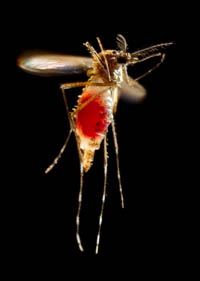NIAID Scientists Use Reverse Genetics to Develop Potential Dengue Vaccine
Joining the global fight against a disease that threatens approximately 2.5 billion people annually, researchers in the NIAID Laboratory of Infectious Diseases (LID) are developing a vaccine against dengue fever. Dengue occurs mostly in tropical and subtropical regions of the world. In 2008, Brazil suffered an explosive outbreak of the disease, which sickened more than 473,000 people.
 |
| A female Aedes aegypti mosquito with a fresh blood meal visible through her transparent abdomen. A. aegypti mosquitoes are the principal transmitters of dengue fever. Credit: CDC |
While dengue is not usually fatal, it can lead to the deadlier dengue hemorrhagic fever and dengue shock syndrome (DHF/DSS). The World Health Organization estimates that dengue causes 22,000 deaths annually, mostly in children. This reality, combined with increasing reports of dengue expanding into temperate climates, such as those along the U.S.-Mexico border and in Puerto Rico, makes finding an effective, safe, and affordable vaccine more important than ever.
One major obstacle in the search for such a vaccine is the existence of four different types of the dengue virus, called dengue 1, dengue 2, dengue 3, and dengue 4. When a person is exposed to one type of the virus, he or she builds immunity to only that specific type. If that person is later infected with a different type of dengue virus, not only is he or she susceptible to dengue fever, but he or she is at increased risk for developing severe DHF/DSS. Because the disease is enhanced with re-infection, any vaccine must provide equal protection to all four types of dengue virus. Researchers refer to this as a tetravalent (or four-way) vaccine.
In LID, researchers have had success developing a vaccine using a technique called “reverse genetics,” meaning that they were able to produce the virus using cloned cDNA, as opposed to the wild virus. They created vaccine candidates for dengue 1 and dengue 4 that were safe, that did not cause symptoms of dengue fever, and that created a high level of immunity to the dengue types. Using the effective vaccine candidate for dengue 4, LID researchers were able to create “chimeric,” or hybrid, vaccines for dengue 2 and dengue 3.
Testing vaccine candidates for dengue fever can be challenging because there is no animal model of dengue infection that develops the same clinical signs and conditions that appear in humans. Testing the vaccines in monkeys or in other animal models does not necessarily lead to results that are applicable to humans. Despite this challenge, LID has created vaccine candidates for all four types of dengue virus that have been tested in the earliest stage of clinical trials.
Phase I clinical trials of the dengue 1 and dengue 4 vaccines showed them to be safe and to induce a potent and durable immune response against the respective virus types, making them promising vaccine candidates for inclusion in a tetravalent vaccine. The Phase I clinical trial of the dengue 2 vaccine showed the candidate to be well tolerated by human volunteers and worthy of further evaluation. Phase I clinical trials of several dengue 3 vaccine candidates are currently ongoing.
A promising finding from the trials is that all four of the vaccine candidates reduced the level of virus transmission from humans to mosquitoes. Because dengue circulates from human to mosquito to human, eliminating transmission to the insect carriers will help ease the burden of disease even among those not exposed directly to the vaccine.
back to top